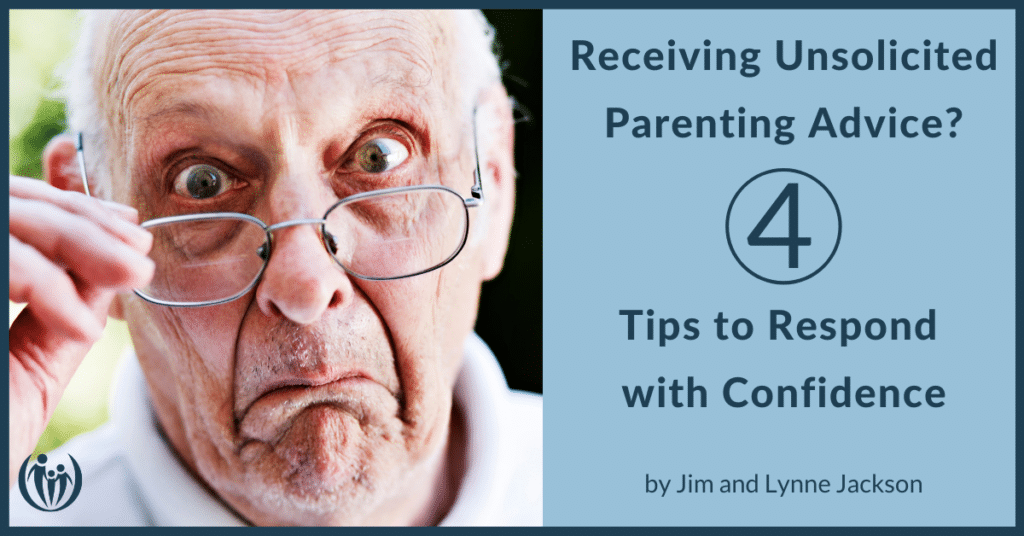
Receiving Unsolicited Parenting Advice?
4 Tips to Respond with Confidence

Do you ever feel like your family is under the microscope at holiday gatherings? People you love can’t help but offer their own take on your parenting—providing you with parenting advice that’s both unsolicited and unwanted, and you feel judged; that your best efforts are not good enough. This can be especially true if you are working to parent differently than you were parented.
A coaching client, Denise, shared this story of raising a sensitive, intense child, “It was really tough when friends or family would criticize my child and then offer unsolicited advice. I even heard, ‘That child is just a spoiled brat, you just need to be tough on her.’”
Ouch! You may have even heard similar unsolicited parenting advice at random times. At holidays or family gatherings the “advice” only adds to the stress of an already stressful event.
The New York Times stated, “Researchers asked 475 mothers of children up to the age of 5 across the United States about feeling judged for their parenting skills. Sixty-one percent felt that they had been judged, with most of the criticism… coming from folks within their own family…”
Another survey of parents of toddlers (ages 1-3) revealed that “nearly 9 in 10 parents across the board feel judged (90% moms and 85% dads), and almost half say they feel judged all the time or nearly all the time (46% moms; 45% dads).”
Your lively kids (in unfamiliar places, with disrupted sleep, lots of sugar and cousins, and without their usual toys) often reflect the stress all around them as well as offload their own stress! That means they may get loud, obnoxious, and argumentative. The icy stares or sidelong glances from relatives, especially your parents, can communicate, “That is soooo disrespectful and clearly needs some firm discipline.”
You may even receive direct comments like, “Aren’t you going to deal with that?” or, “You really shouldn’t tolerate that disrespect!”
Denise had that exact experience: “From some older adults in my life, I’d get comments like, ‘I just never would have tolerated that’”.
You are trying to approach your parenting in more graceful, wisdom-building ways! You want to stay the course! But maybe you don’t know how to respond without sounding disrespectful to your critics, who think they’re helping.
It’s normal to second guess yourself and become harsh or firm in unnatural ways with your kids, just to avoid the criticism. This inconsistency and change in your parenting only makes things confusing for your children and sets them up for more negative responses.
It was really tough when friends or family would criticize my child and then offer unsolicited advice. I even heard, ‘That child is just a spoiled brat, you just need to be tough on her.’
Denise, a coaching client
This dynamic often creates a downward spiral.
See if you relate to this:
So what can you do?
How to get ready for unsolicited parenting advice
You know best what your kids need – so set boundaries clearly ahead of time about activities and length of stay. Know that however you decide to parent needs to be with conviction that this is how God is calling you to parent.
You can determine ahead of time how you want to respond and even roleplay with a spouse or friend so you are well prepared with a solid, confident response.
Here are a couple of examples:
Denise shared her strategy:
“A response that I used a lot, (sometimes out of exasperation) was ‘Tell me how? How exactly would you have handled that?’ And it put people back a little, to realize ‘Oh, I don’t know everything that is going on here.’ It allowed me space to take a breath and then say ‘I’ve tried a lot of things, and I am working really hard’. This response seemed to break the pattern of people offering their comments freely.”
If you’re comfortable, you can even share Luke 1:17, Ephesians 6:4, and/or Galatians 6:1. If they seem sincerely interested, you may even want to share with them our blog post on immediate obedience.
2. Empathize and affirm
Empathize
What we know to be true: When people feel out of control they tend to get more controlling. Your parents (or other relatives) may simply be overwhelmed and therefore controlling, so start with empathy, “I understand your normally peaceful house can get pretty chaotic at the holidays. It’s got to be tough when one of my kids is struggling.”
Affirm intentions
Your friends and relatives care about you and your kids and may sincerely believe that “obedience or else” parenting is truly best for your kids. So what can you do to validate their good intentions without validating their unhelpful methods? Here’s how it might go: “Mom/Dad, I know you are concerned for our kids and want the best for them. I’m so glad that you care enough to express that.”
Affirm actions
Then affirm whatever they’ve done that is helpful (be prepared with an example). “I love how you… (have so much fun baking together, tell the best stories at bedtime, were really patient when…)
Enjoying this article? Check out our printable PDF “cheat sheet” you can keep in your purse or your suitcase as a reminder.
3. Offer a few practical tools
People tend to get harsh or punitive when they don’t know what else to do. You can give practical tools and insights about your kids, which will help them engage when they see a problem, especially if you’re not around.
Here are a few examples:
You might tell your parents, “You don’t have to ignore kids’ misbehavior. But especially since we don’t see you every day, I want my kids to really enjoy their time with you.”
Consider giving your relatives these phrases to say to your kids when they’re struggling or misbehaving:
If your parents are truly interested in learning more…
4. Strengthen your kids
If you know your kids are likely to face some harshness or criticism during a gathering, be proactive to equip them ahead of time.
Focus on the opportunity
If you believe your parents’ responses will be damaging to your children, your kids will sense your anxiety. But if you view this challenge as a good learning opportunity to respond to different kinds of people, they’ll be more confident and less likely to view themselves (or their grandparents) as a problem to be fixed. Your positive perspective can make a big impact!
Talk about potential holiday tension
With a peaceful, light-hearted tone ask, “We sure love Grandma and Grandpa, and it can be a lot of fun to see them! But sometimes it gets a little stressful at their house, doesn’t it? What’s good about being there? What’s hard about being there?” Validate any difficult feelings without blaming anyone.
Help kids stand in the truth
Remind your kids, “Not everyone agrees with the way we want to parent you. So remember, even if someone talks to you in a harsh or critical way, you are still a valuable person. Those people love you but might show it differently when they’re upset. Let me know if I can help you if this happens.”
So when that smiling friend or relative hands you their totally unsolicited, critical parenting advice…
Just like your kids, you’ll need to hold onto what’s true! Your kids are not your report card, and they will misbehave in front of your relatives at some point. When relatives comment on your parenting or your kids’ behavior (despite all your great preparation beforehand), remember what’s true!
Above all else, you and your children can all keep these truths in mind that no matter how it goes:
If you want a visual reminder of these 4 tips for how to respond to unsolicited parenting advice, enjoy this printable PDF “cheat sheet” you can keep in your purse or your suitcase as a reminder.
Frustrated by constant discipline challenges? Take 15 minutes to read our free ebook 4 Messages Every Child Longs to Hear: A Discipline That Connects Overview.






